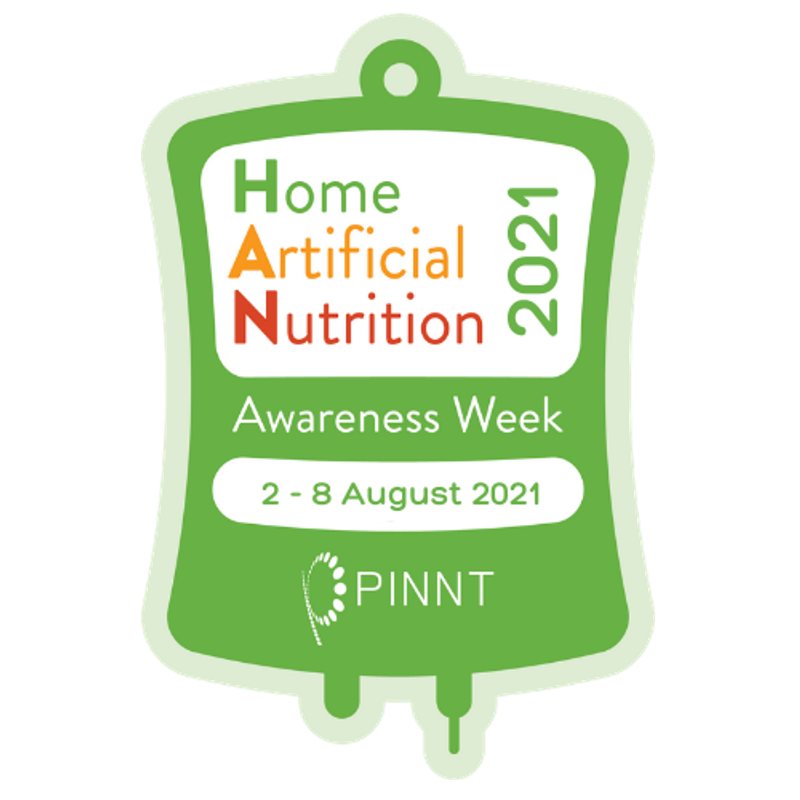
Posted on: August 02, 2021
Home Artificial Nutrition Week 2021 - engage, share, listen and learn.
This week is dedicated to raising awareness about essential treatments - covering parenteral nutrition, enteral nutrition and oral nutritional supplements for people at home and in the community. A campaign led by the support group PINNT (Patients on Intravenous and Naso-gastric Nutrition Treatment), HAN week includes a variety of activities and new resources to be published.
For those that need it, medical nutrition can be life changing, or for some people it can be life saving.
Parenteral nutrition
Parenteral nutrition is nutrition delivered directly into the veins for patients who have an inaccessible or non functioning gastrointestinal system.
The National Institute for Health and Clinical Excellence (NICE) recommends that that health professionals should consider parenteral nutrition for for patients who are malnourished or at risk of malnutrition at risk and have an inadequate or unsafe oral and/or enteral nutritional intake, or a non-functional, inaccessible, or perforated (leaking) gastrointestinal tract.
Some patients may require parenteral nutrition on a long term basis and may be discharged on home parenteral nutrition. For those patients whose gastrointestinal function improves or recovers, parenteral nutrition may be gradually withdrawn, but only once adequate oral or enteral nutrition is tolerated and nutritional status is stable.
Around 1,500-1,800 patients in the UK receive parenteral nutrition at home at any one time, improving their quality of life. Patients are able to leave hospital and receive life-saving nutrition treatment in the comfort of their own homes.
As parenteral nutrition goes directly into the bloodstream, it is produced and administered aseptically. You can find out more about the safety of parenteral nutrition by reading our article: Parenteral Nutrition: Ensuring quality throughout preparation, supply & administration.
Enteral tube feeding
Enteral tube feeding is required when nutritional requirements cannot be met by regular food intake. This can be a consequence of many clinical conditions, including illness, decreased appetite or difficulties in swallowing.
Enteral nutrition can be provided by tube feeding either via a naso-gastric tube placed through the nose, or a percutaneous endoscopic gastrostomy (PEG) tube directly into the stomach. Enteral nutrition requires a functioning, or at least a partially functioning, gut.
The choice of route depends on the clinical condition of the patient, their GI function, anatomy and access and expected duration of feeding. Whichever feeding tube is chosen, they all are important to enhance quality of life.
Oral nutritional supplements
Oral nutritional supplements (ONS), otherwise known as sip feeds, are specialised foods designed to help meet the nutritional or dietary needs of patients living with a disease, disorder or medical condition who are temporarily or permanently unable to achieve an adequate nutritional intake from normal foods and are at risk of malnutrition.
Patients requiring ONS range from those who are critically ill, to those with inherited genetic disorders to those with chronic illnesses, including cancer, kidney failure, cystic fibrosis, diabetes, difficulties with swallowing, loss of muscle mass and respiratory disease.
ONS can be an essential part of medical management and may be required either for life or for short periods of time, for example in patients recovering from a stroke or surgery. In these cases, they help to manage malnutrition, or guard against it, until a normal diet can be resumed.
The Managing Adult Malnutrition in the Community pathway is evidence based guidance developed by healthcare professionals and is supported by organisations such as the Royal College of General Practitioners (RCGP), the Royal College of Nursing (RCN) and the British Dietetic Association (BDA). It clearly sets out how ONS should be prescribed and used alongside food to manage disease-related malnutrition. It also provides guidance on how to monitor use of ONS and when to discontinue it.
BSNA Members produce medical nutrition (parenteral nutrition, enteral tube feeds and ONS) which can be used from birth to older age. Medical nutrition is highly regulated and should always be used under medical supervision.
For many patients, they wouldn't have their quality of life without their feed. Medical nutrition makes it possible for people who are not able to eat enough orally to receive appropriate access to the nutrition they need to live.
#HANWeek2021 #HAN
-
To find out more information about HAN Week 2021, please visit www.pinnt.com